Mental health is an essential aspect of our overall well-being, yet it often remains overlooked in discussions about health care. As society becomes more aware of the profound impact that mental and emotional health have on our daily lives, there is a growing recognition of the need for accessible and effective mental healthcare . Navigating this complex landscape can be daunting, especially for those who may have never sought help before or are unsure of where to begin.
In this article, we will explore various pathways to better mental health, highlighting the importance of understanding mental healthcare options available today. From traditional therapies to innovative approaches, we aim to provide insights that empower individuals to prioritize their mental well-being and seek the support they need to thrive. Managing mental health is not just about addressing issues as they arise; it is about fostering resilience and cultivating a balanced, fulfilling life.
Understanding Mental Health
Mental health is a fundamental aspect of our overall well-being, encompassing our emotional, psychological, and social stability. It influences how we think, feel, and act, and it plays a crucial role in how we handle stress, relate to others, and make choices. Understanding mental health involves recognizing that it is not merely the absence of mental illness but a state of thriving where individuals can cope with the normal stresses of life, work productively, and contribute to their community.
Various factors can affect mental health, including biological, environmental, and lifestyle components. Genetics may predispose individuals to certain mental health conditions, while life experiences such as trauma, abuse, or significant life changes can trigger symptoms. Moreover, social determinants like economic stability, education, and access to healthcare also play a significant role in mental health outcomes, highlighting the complexity of this field.
Promoting mental health requires a comprehensive approach that includes awareness, prevention, and support. Understanding the signs of mental health issues is vital for early intervention and effective treatment. Education about mental health encourages individuals to seek help when needed and helps to reduce the stigma often associated with mental health challenges. By fostering an environment of openness and support, we can navigate the path toward better mental health for ourselves and others.
Barriers to Accessing Care
Accessing mental healthcare can be a daunting challenge due to a variety of barriers that individuals may face. One of the primary obstacles is the stigma surrounding mental health issues. Many people may feel ashamed or fear judgment from others, which can prevent them from seeking help. This societal stigma often leads to isolation and an increased reluctance to discuss mental health matters openly, ultimately hindering a person's ability to access the care they need.
Another significant barrier is the availability and affordability of services. In many regions, there is a shortage of mental health professionals, making it difficult for individuals to find suitable care. This issue is often compounded by high costs associated with therapy and medication, which can deter those without insurance or sufficient financial resources from seeking assistance. The mismatch between demand for services and the supply of qualified professionals creates a significant gap in mental healthcare access.
Transportation and logistical challenges also play a crucial role in restricting access. Individuals living in rural or underserved urban areas may not have easy access to mental health facilities, and public transportation options may be limited. Additionally, those juggling work, family responsibilities, or personal health challenges may find it difficult to commit to regular appointments. These practical hurdles can create significant barriers to receiving necessary mental healthcare, leaving many without the support they require.
Strategies for Improvement

Improving mental healthcare begins with increasing awareness and reducing stigma surrounding mental health issues. Educational programs can play a crucial role in informing individuals about the importance of mental health and the resources available for support. By fostering open conversations about mental health, we can create an environment where individuals feel safe to seek help and share their experiences. Community events and workshops can also help demystify mental health topics, making access to care more approachable for everyone.
Another essential strategy is the integration of mental health services into primary healthcare settings. This approach ensures that mental health is treated with the same importance as physical health, making it easier for patients to receive comprehensive care. Training primary care providers to recognize and address mental health concerns can lead to early intervention and better outcomes. Furthermore, incorporating mental health professionals into primary care teams encourages collaboration and creates a more holistic treatment plan tailored to each individual’s needs.
Lastly, the use of technology can significantly enhance access to mental healthcare. Teletherapy and mental health apps provide opportunities for individuals to connect with professionals from the comfort of their homes. This flexibility is particularly beneficial for those in rural areas or those who may have difficulty accessing traditional in-person services. By harnessing technology, we can remove barriers to care and empower individuals to take control of their mental health journey.
